Kaddish – His Will
Leor Jacobi
Note: I wrote the following essay outline several years ago, but shelved it upon discovering that most of its novelty and much more had already been published by David de Sola Pool over a hundred years ago.[1] On the sad occasion of the recent passing of my beloved mother I offer it now in her memory. Prayer and divinity were close to her heart. May our prayers be deepened by their study.
The Kaddish is one of the most familiar and repeated prayers in the liturgy. In various forms, it concludes both the main body of the prayer and smaller sections. It is also recited by mourners and upon the conclusion of learning a tractate or a sermon.
Despite, or perhaps due to its familiarity, few are aware of an alternate interpretation and syntax at the beginning of the Kaddish, accompanied by altering the pronunciation of one word slightly, but significantly. This study will describe and analyze these two interpretations and propose a third.
1. The “Standard” interpretation. R. Yehudah ben Yakar (Ramban’s teacher), Rokeah, and Avudraham all followed the standard interpretation. See R. Shmuel Eliezer Stern’s concise compilation of their perspectives.
2. The GRA’s interpretation
3. Alternate interpretation
1. The Standard Interpretation
…יִתְגַּדַּל וְיִתְקַדַּשׁ שְׁמֵהּ רַבָּא בְּעָלְמָא דִּי בְרָא כִרְעוּתֵהּ, וְיַמְלִיךְ מַלְכוּתֵהּ
May his great name be exalted and sanctified in the world which he created according to his will. And may his kingship reign …
The deity is not referred to directly, but his great name is to be exalted and sanctified in the very world which he himself created, according to his own will and volition. The fact that the world was created according to the will of the deity seems rather obvious, pshita. However, in the liturgy of the evening prayers, we find the divine will associated with the maintenance of the celestial bodies:
ברוך אתה … אשר בדברו מעריב ערבים בחכמה פותח שערים ובתבונה משנה עתים ומחליף את הזמנים ומסדר את הכוכבים במשמרותיהם ברקיע כרצונו
This may be referred to in the Kaddish. Perhaps the divine will is mentioned in the Kaddish to emphasize that the details of the physical world were planned by the creator, not happenstance, hence it is fitting to exalt and praise his great name.
A more serious difficulty with this standard interpretation is found in the prayer על הכל based on the Kaddish which is recited upon removing the Sefer Torah from the Aron Ha-Kodesh. In modern prayerbooks it is found among the Sabbath prayers. In surviving synagogues of Tikocyn (טיקטין) and Krakow and in in other Polish synagogues the text was painted on the wall along with other “extra” prayers and sayings.[2] This prayer clearly parallels the Kaddish, but does not follow the standard interpretation, as will be explained in the next section. R. Yehudah ben Yakar (Ramban’s teacher), Rokeah, and Avudraham all followed the standard interpretation. See R. Shmuel Eliezer Stern’s
concise compilation of their perspectives.
2. The GRA’s Interpretation
…יִתְגַּדַּל וְיִתְקַדַּשׁ שְׁמֵהּ רַבָּא בְּעָלְמָא דִּי בְרָא, כִּרְעוּתֵהּ, וְיַמְלִיךְ מַלְכוּתֵהּ
May his great name be exalted and sanctified, according to his will, in the world which he created. And may his kingship become regnant…
Notice the additional comma and the concomitant hard vocalization of the כּ with a dagesh in the following word: כִּרְעוּתֵהּ. Here the phrase “according to his will” refers back to the first clause of the preceding phrase, the exaltation and sanctification. It does not refer to the immediately preceding clause as per the standard interpretation.
The minor conceptual difficulty of the standard interpretation is now transformed into a deep and compelling concept. The purpose of the creation of the world was so that the creator’s name be exalted and sanctified within it.
This interpretation can be attributed to the Gaon, R. Elijah of Vilna, GRA in Ma’ase Rav 54, where it is noted that he was particular about the pronunciation of the hard כּ. GRA’s Diyyuqim b’nusḥey ha-tefilah v’ha-berakhot were first printed in the first edition of Shulhan Arukh with Biyur ha-GRA, Shklov 1803, and appear at the bottom of the first page of Priy Chodosh in later editions.
There, the concept it is explained more fully, with a proof is presented in the aforementioned על הכל prayer recited upon removing the Torah from the Ark:
עַל הַכּל יִתְגַּדַּל וְיִתְקַדַּשׁ וְיִשְׁתַּבַּח וְיִתְפָּאַר וְיִתְרומַם וְיִתְנַשּא שְׁמו שֶׁל מֶלֶךְ מַלְכֵי הַמְּלָכִים הַקָּדושׁ בָּרוּךְ הוּא. בָּעולָמות שֶׁבָּרָא הָעולָם הַזֶּה וְהָעולָם הַבָּא. כִּרְצונו וְכִרְצון יְרֵאָיו וְכִרְצון כָּל בֵּית יִשרָאֵל. צוּר הָעולָמִים אֲדון כָּל הַבְּרִיּות אֱלוהַּ כָּל הַנְּפָשׁות. הַיּושֵׁב בְּמֶרְחֲבֵי מָרום הַשּׁוכֵן בִּשְׁמֵי שְׁמֵי קֶדֶם. קְדֻשָּׁתו עַל הַחַיּות וּקְדֻשָּׁתו עַל כִּסֵּא הַכָּבוד
Note that this Hebrew prayer generally follows the structure of the Kaddish. However, the phrase “According to his will” is accompanied by “the will of those who fear him” and “the will of all of the house of Israel.” This cannot refer to the creation of the world, for mortals were not party to that event. Perhaps it refers to the post-facto consent of men. If so, it would differ conceptually with כרצונו, the will of the creator at the time of the creation. Also, stressing this point runs counter to the thrust of the prayer, exalting and praising the creator.
Wall of Tykocin synagogue, Poland, Leor Jacobi
This source suggests that an ancient tradition does not follow the standard interpretation. Furthermore, we find an association of the words כרצונו and יתגדל in Daniel 11:36, applied to an earthly king:
…וְעָשָׂה כִרְצוֹנוֹ הַמֶּלֶךְ וְיִתְרוֹמֵם וְיִתְגַּדֵּל עַל כָּל אֵל וְעַל אֵל אֵלִים יְדַבֵּר נִפְלָאוֹת
Some medieval prayer books do contain a hard כּ in כרעותיה. In the National Library of Israel there are examples from Provence, Italy, and Ashkenaz on microfilm. I refer to this interpretation as the GRA’s, although it probably preceded him by hundreds of years, because he related to the issue and is understood to have favored this interpretation. It should be noted that many early siddurim were not precise in following grammatical rules so the mere presence or absence of a dagesh should not in and of itself be taken as an indicator of syntax or interpretation.
GRA’s interpretation, while not well known, was endorsed somewhat in Arukh haShulhan 56 (where much of the previous discussion is found). GRA-oriented prayerbooks also reflect this interpretation via the punctuation, such as Siddur Vilna and Ezor Eliahu. However, Siddur Tefilat Yosef features the hard כִּ but without a comma before it, possibly a compromise approach: have it both ways or either way.
I now raise a couple of difficulties. The most striking aspect of this approach is its awkward word order. A much more straightforward formulation of GRA’s interpretation would be:
…יִתְגַּדַּל וְיִתְקַדַּשׁ שְׁמֵהּ רַבָּא. כִרְעוּתֵהּ, בְּעָלְמָא דִּי בְרָא, וְיַמְלִיךְ מַלְכוּתֵהּ
Perhaps the word כִּרְעוּתֵהּ was a later addition, hence not deemed proper to insert in the middle of the first phrase. In any case, GRA’s interpretation does not fit the text as well as the standard interpretation, where no re-ordering is required.
A minor difficulty with the GRA’s interpretation emerges upon comparison with the “Great Kaddish” recited upon the completion of a Tractate or Seder. The word כִּרְעוּתֵהּ does not appear in that text at all. This is explainable, and perhaps even necessary, according to the first interpretation, because the Great Kaddish does not refer to the creation of the world at all, but rather to the future redemption:
יִתְגַּדַּל וְיִתְקַדַּשׁ שְׁמֵהּ רַבָּא בְּעָלְמָא דִּי הוּא עָתִיד לְאִתְחַדְתָּא, וּלְאַחֲיָאה מֵתַיָּא, וּלְאַסָּקָא יַתְּהוֹן לְחַיֵּי עָלְמָא, וּלְמִבְנָא קַרְתָּא דִּי יְרוּשְלֵם, וּלְשַׁכְלְלָא הֵיכָלֵהּ בְּגַוָּהּ, וּלְמֶעֱקַר פּוּלְחָנָא נוּכְרָאָה מִן אַרְעָא, וּלְאָתָבָא פּוּלְחָנָא דִּי שְׁמַיָּא לְאַתְרָהּ, וְיַמְלִיך קוּדְשָׁא בְּרִיךְ הוּא בּמַלְכוּתֵה וִיקָרֵהּ בְּחַיֵּיכוֹן וּבְיוֹמֵיכוֹן וּבְחַיֵּי דְכָל בֵּית יִשְׂרָאֵל
However, if כִּרְעוּתֵהּ refers back to יִתְגַּדַּל וְיִתְקַדַּשׁ, as per GRA’s interpretation, the absence of the word in the Great Kaddish version is puzzling, or at least conspicuous. This suggests that כִּרְעוּתֵהּ refers back to בְּעָלְמָא דִּי בְרָא and hence, disappears in the Great Kaddish along with it.
To summarize so far, we have seen two competing interpretations of the same (orthographic) text of the Kaddish. Some evidence contradicts each of the two, with no clear tilt of the scales in favor of either. It seems to me more likely that the GRA’s interpretation would develop into the standard one in order to “correct the syntax” than the reverse direction. Lectio dificilior potior. This situation suggests exploring other alternatives.[3]
3. An Alternate Interpretation
…יִתְגַּדַּל וְיִתְקַדַּשׁ שְׁמֵהּ רַבָּא בְּעָלְמָא דִּי בְרָא, כִּרְעוּתֵהּ יַמְלִיךְ מַלְכוּתֵהּ
May his great name be exalted and sanctified in the world which he created. May his kingship become regnant according to his will …
Rather than throwing the word כִּרְעוּתֵהּ back to one clause or another of the previous phrase, in this interpretation the word applies to the text that follows, a prayer for the establishment of the divine kingdom.
This interpretation is aided by the omission of the ו in the word ימלך following the word כרעותיה. The emendation is minor, and we do find an early textual example from a manuscript in the Cairo Geniza, JTS ENA 1983.2:
The absence of the ו assists this interpretation but it does not in and of itself negate the others. However, the interpretation is also suggested by another rabbinic source. The על הכל prayer discussed previously appears to be a later adaptation, an earlier version of which appears in Masekhet Sofrim 14:6:
ועוד צריך לומר, על הכל יתגדל ויתקדש וישתבח ויתפאר ויתרומם ויתנשא ויתהדר ויתעלה ויתהלל ויתקלס שמו של מלך מלכי המלכים הקדוש ברוך הוא הנכבד והנורא בעולמות שברא בעולם הזה ובעולם הבא. כרצונו וכרצון יראיו וכרצון כל עמו בית ישראל תגלה ותראה מלכותו עלינו במהרה ובזמן קרוב, והוא יבנה ביתו בימינו ויחון פליטתינו ופליטת כל עמו בית ישראל בהמון רחמיו וברוב חסדיו לחן ולחסד ולרחמים לחיים ולשלום והוא ירחם עלינו ועל כל עמו בית ישראל בעבור שמו הגדול ואמרו אמן
I added some punctuation above and would translate part of the prayer literally as follows:
… in the worlds that he has created, this world and the next one. According to his will, the will of those in awe of him, and the will of his entire people, the house of Israel, his kingship shall be revealed and appear to us speedily and soon. He shall rebuild …
One may argue that, here too, the phrase: “According to his will…” refers back to the previous clause. In the adapted form that appears in prayer books, the phrase must be understood as referring back to the previous phrase, since the following phrase simply doesn’t appear. However, in this expanded and seemingly earlier form in Masekhet Sofrim, we would expect a connecting ו to follow the phrase, even more so than in the Kaddish itself, yet we do not find one. When על הכל was adapted from this prayer, the syntax was adjusted or corrupted.
The difficulty noted above in reconciling the GRA’s interpretation with the Great Kaddish is relieved via this approach, if not eliminated. The absent word כרעותיה is explained if the substantial additions in the Great Kaddish are an expansion[4] of כרעותיה.
May his great name be sanctified and exalted by the reign of his kingdom in the world he created, according to his will.
[1] David de Sola Pool, The Kaddish, Leipzig 1909, pp. 28, 33-35, 111-112. Among issues not covered here, see especially parallels in various verses and to the Christian Lord’s Prayer (Paternoster).
[2] In the “Isaac Shul” of Krakow על הכל was written in three different locations which have been restored and are all visible today. It may have moved from location to location at different periods and different layers were restored. Alternatively, it may have been painted in different locations for the convenience of the worshippers, so that they would not have to strain or move to another location during the procession after removing the Torah scroll from the Ark.
[3] My first attempt was to propose that the word כִּרְעוּתֵהּ is itself an erroneous later scribal addition. An ancient tradition maintains that one should bow during the Kaddish at several places. Sefer Kra’ Ravaṣ, by Rabbi Yehuda Lavi Ben-David is an excellent modern halakhic compendium of the various laws of bowing, accompanied with much original analysis.
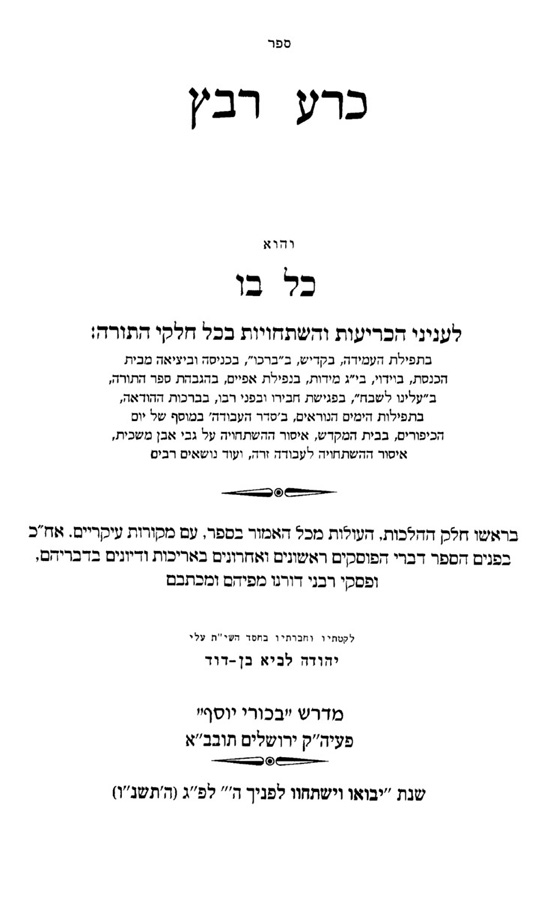
The book lists no fewer than seventeen different opinions as to where exactly to do the bowing. Some medieval prayer books have a Hebrew instruction to bow written in the margin: כרע. These might have been misinterpreted as Aramaic and incorporated into the text of the Kaddish itself. However, since I have not located any significant textual evidence to support this theory, I mention it here solely for the reader’s edification and entertainment.
[4] If the third alternative is a genuine interpretation of the text of the Kaddish, and an early one, it could hypothetically have developed into the other interpretations.
First, the standard interpretation developed. The word כרעותיה was understood as referring back to the immediately preceding creation of the world and in tandem a ו was introduced verbally in וימלך. Alternatively, the Great Kaddish may have been composed or edited in accordance with the first, standard interpretation. This development may have been the result of a growing influence of the written texts, without vocalization and punctuation, as opposed to earlier oral forms which would have preserved the original interpretation.
Next, this new interpretation collided with the original, possibly in written form, with the ו in וימלך being introduced where the original interpretation was preserved orally along with the hard כּ of כרעותיה. This friction would have been resolved by artificially throwing back כרעותיה to the beginning of the first phrase, giving birth to the GRA’s interpretation.
Or כרעותיה originally went in both directions, following both GRA and the alternate interpretation, as De Sola Pool proposed (see note above).
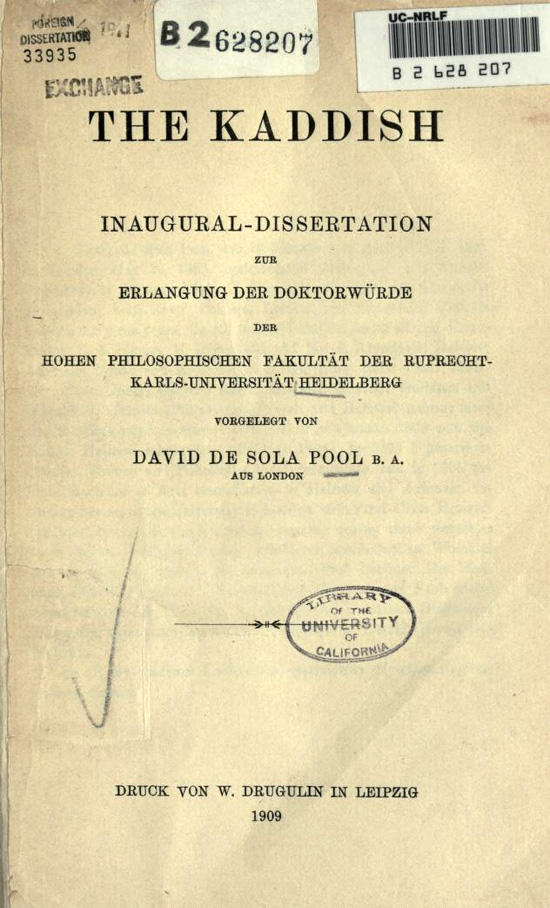
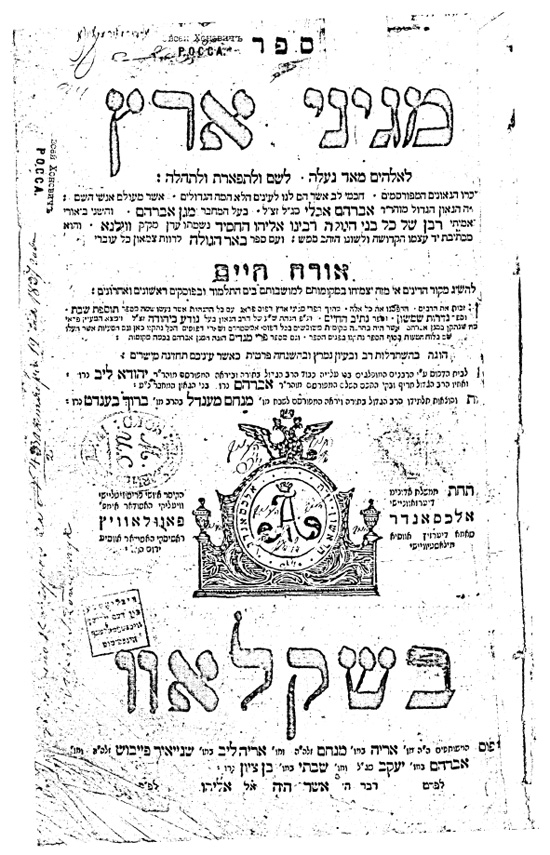
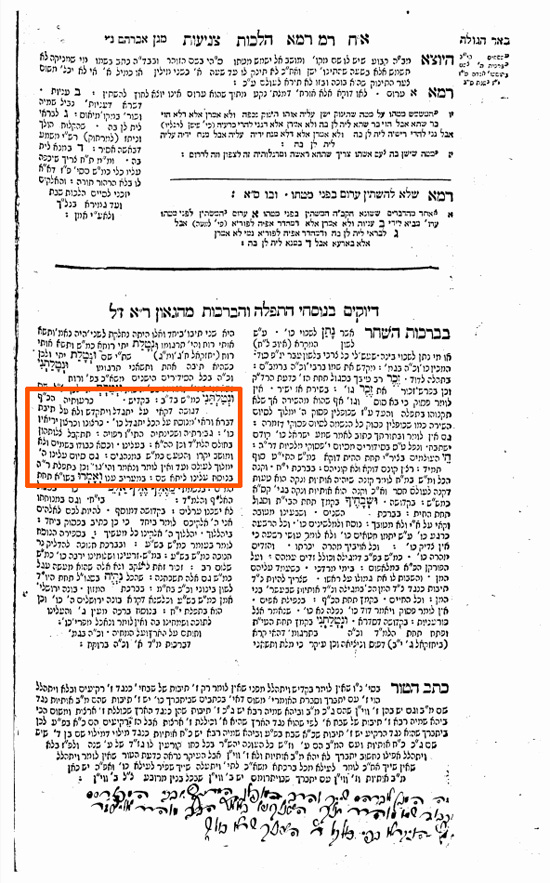
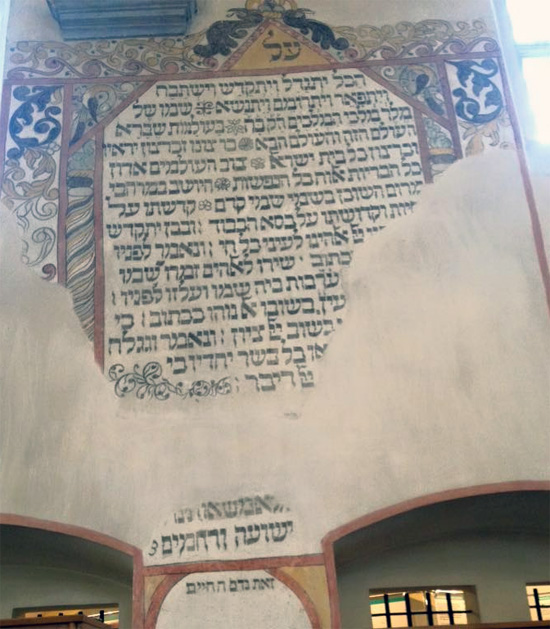
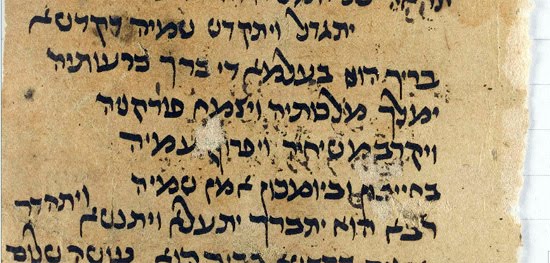




2 thoughts on “Kaddish – His Will”
While I enjoyed Leor Jacobi's essay, which collated and presented the various possible understandings of כרעותיה very nicely, I found its arguments from syntax unconvincing:
1. In the first place, the author argues that "The most striking aspect of [the גר"א's] approach is its awkward word order. A much more straightforward formulation of GRA's interpretation would be:
…יִתְגַּדַּל וְיִתְקַדַּשׁ שְׁמֵהּ רַבָּא. כִרְעוּתֵהּ, בְּעָלְמָא דִּי בְרָא, וְיַמְלִיךְ מַלְכוּתֵהּ
… GRA's interpretation does not fit the text as well as the standard interpretation, where no re-ordering is required."
This is only a difficulty if one assumes that, per the גר"א's interpretation, כרעותיה refers strictly to the first 4 words of the קדיש, the verb phrase "יִתְגַּדַּל וְיִתְקַדַּשׁ שְׁמֵהּ רַבָּא". However, it's perfectly reasonable to interpret it as referring to the larger verb phrase consisting of the first seven words: "יִתְגַּדַּל וְיִתְקַדַּשׁ שְׁמֵהּ רַבָּא בְּעָלְמָא דִּי בְרָא". In fact, that is exactly the way Jacobi seems to have understood this interpretation previously in the essay, when he described it as "a deep and compelling concept. The purpose of the creation of the world was so that the creator's name be exalted and sanctified within it." [emphasis added]. If כרעותיה modified only the first 4 words of קדיש, it would perforce be describing only "that the creator's name be exalted and sanctified" as "his will". In order to include the requirement that this sanctification take place "in the world that he created" in "his will", כרעותיה must be modifying the phrase consisting of the first seven words of קדיש, so I'm at a loss to reconcile Jacobi's interpretation of the [גר"א's version of the] text, with his description of its syntax.
2. In the second place, as a further difficulty with the גר"א's interpretation, Jacobi notes the absence of כרעותיה in the parallel phrase of קדיש דרבנן as "puzzling, or at least conspicuous"; hence, suggestive "that כִּרְעוּתֵהּ refers back to בְּעָלְמָא דִּי בְרָא and hence, disappears in the Great Kaddish along with it".
If כרעותיה appeared after the first four words of קדיש [as Jacobi believes would be the most natural syntax], I would agree that its omission from the same location in קדיש דרבנן would be puzzling. However, if it is bound to appear after the entire phrase "…. יתגדל…בעלמא די", I humbly submit that כרעותיה might well be omitted for the simple reason that including it forces the listener to retain the entire preceding, long and complicated verb phrase in memory in order to resolve the modifier כרעותיה. This is difficult for people to do, so כרעותיה might well have thus been omitted for clarity of style.
Jacobi's favored interpretation of כרעותיה, that it applies to the following phrase, beginning ו]ימליך], forces him to go in search of variant texts that omit the ו that appears in all standard texts. The evidence that he attempts to bring from Masekhet Sofrim 14:6 relies on the punctuation that he himself inserts there! His argument that the context there, supports this punctuation rests on the slender evidence of a ו that he feels ought to connect the clauses יתגדל… and ימליך… (never mind that he himself feels free to ignore the ו that does appear in the text of קדיש, when it doesn't support his interpretation!), but, accepting his premise for argument's sake, it's hard to see how his repunctuation addresses the problem, since, whether the second clause begins with ימליך or כרעותיה, it unquestionably is not linked to the first clause by a ו in this text.
Furthermore, a closer reading of the text in מסכת סופרים renders Jacobi's interpretation practically untenable, as it would emerge that we [כלל ישראל, who recite this text] refer to ourselves alternately in the third person [כל בית ישראל] and in the first person [עלינו] within a single clause! Thus, this text appears to constitute evidence against Jacobi's favored interpretation, rather than for it.